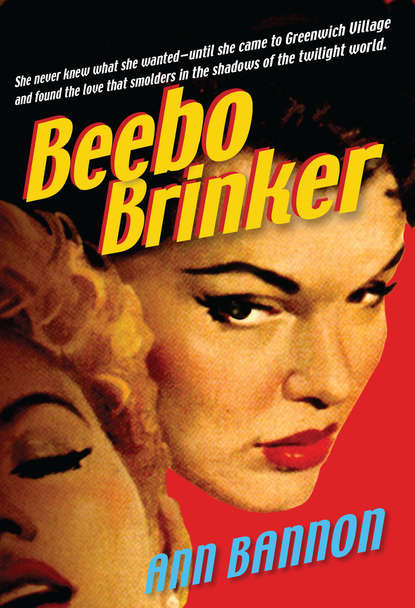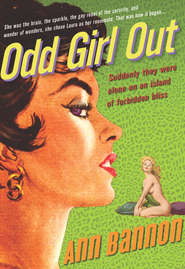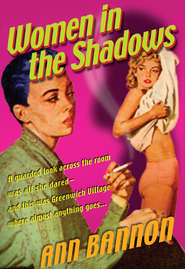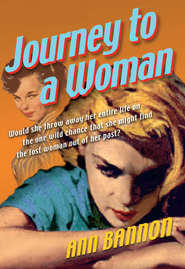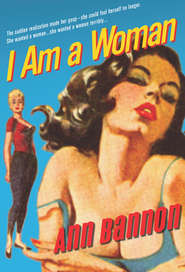По всем вопросам обращайтесь на: info@litportal.ru
(©) 2003-2024.
✖
Beebo Brinker
Автор
Год написания книги
2019
Настройки чтения
Размер шрифта
Высота строк
Поля
Beebo Brinker
Ann Bannon
The classic 1950s love story from the Queen of Lesbian Pulp Fiction, and author of Odd Girl Out, I Am a Woman, Women in the Shadows, Journey to a Woman and Beebo BrinkerShe never knew what she wanted – until she came to Greenwich Village and found the love that smolders in the shadows of the twilight world.Taking a pseudonym in the interest of privacy, Bannon wrote her first book, Odd Girl Out, as a coming-of-age novel that involved love between college sorority sisters. When an editor singled-out the school-girl romance as her story's most compelling feature, the book was re-written for a lesbian pulp fiction audience. Unlike most pulps, however, Bannon broke with tradition by avoiding sensationalistic plots in favour of emotionally engaged character development.Odd Girl Out enjoyed tremendous success, inspiring other ground-breaking works, most notably Beebo Brinker. Her sensitive renderings of sexuality also won Bannon a devoted following among isolated lesbians everywhere."I got nice letters from a lot of really lovely women, and women who were hurting a lot, and women all over the country," Bannon remarks. "So many saying, 'Thank God I finally got connected with somebody who really knows what this is about.' " The character of Beebo is among the most-loved lesbians ever to appear in gay and lesbian fiction. "I never met Beebo in the flesh, but she was part of my daydreams from a very early time," Bannon says of her ultra-butch protagonist.
“Looking back from the mid-80s to the distant 50s and 60s, let me share a thought with you. The books as they stand have 50s flaws. They are, in effect, the offspring of their special era, with its biases. But they speak truly of that time and place as I knew it. I would not write them today quite as I wrote them then. But I did write them then, of course. And if Beebo is really there for some of you—and Laura and Beth and the others—it’s because I stayed close to what felt real and right.” — ANN BANNON
Beebo Brinker
Ann Bannon
www.spice-books.co.uk (http://www.spice-books.co.uk)
Table of Contents
Cover (#u90292794-b1cb-5899-bc55-cb46b83a1edd)
Excerpt (#u55bda18f-7433-5370-ab6e-b44b9d9e6a6e)
Title Page (#u417af2ed-49c6-58e5-afe5-8ecf2f522e4f)
Beebo Brinker (#udb971c63-60df-5b9a-ad9c-cb9b003cf04c)
Endpages (#litres_trial_promo)
Copyright (#litres_trial_promo)
Beebo Brinker (#ulink_a2b44ff6-3bbd-564c-8384-732a5906ac94)
Jack Mann had seen enough in his life to swear off surprise forever. He had seen the ports of the Pacific from the deck of a Navy hospital ship during World War II. He had helped patch the endless cut and bloodied bodies, torn every which way, some irreparably. He had seen the sensuous Melanesian girls, the bronzed bare-chested surfers on Hawaiian beaches, the sly stinking misery of the caves of Iwo Jima.
A medical corpsman gets an eyeful—and a noseful—of human wretchedness during a war. When it was over, Jack left the service with a vow to lead a quiet uncomplicated life, and never to hurt anybody by so much as a pinprick. It shot the bottom out of his plans to enter medical school, but he let them go without undue regret. He’d be well along in his thirties by the time he finished, and it didn’t seem worth it any more.
So he completed the course he started before the war: engineering. And after he got his degree he took a job in the New York office of a big Chicago construction firm as head of drafting.
During those war years, when Jack was holding heaving sailors over the head and labeling countless blood samples, he had fallen in love. It was a lousy affair, unhappy and violent. But peculiarly good now and then. Good enough to sell him on Love for a long time.
He organized his life around it. He earned his money to pamper whatever passion came his way. That was the only real value his bank account held for him; that, and helping stray people out of trouble, the way others help stray cats.
But by the time Jack reached his thirties, there had been too many who took advantage of his generosity to swindle him; his confidence to cuckold him; his affection to torment him. He turned cynic. There was hope in him still, but he buttoned it down under his skepticism.
He wanted to stabilize his life, settle down with one person and live out a long rewarding love. But Jack Mann could only love other men: boys, to be exact. Volatile, charming, will-o-the-wisp boys, who looked him up Friday, loved him Saturday, and left him Sunday. They couldn’t even spell “stabilize.”
His emotional differentness had given Jack a good eye for people, a knack for sizing them up fast. He usually knew what to expect from a boy after talking to him twenty or thirty minutes, and he had learned not to give in to the type who brought certain suffering—the type who couldn’t spell.
But Jack had also learned that he couldn’t live his life only for love. The less romantic he got about it, the clearer his view of life became. It didn’t make him happy, this cynicism. But it protected him from too much hurt, and gave him a sort of sour wit and wisdom.
Jack Mann was thirty-three years old, short in height, tall in mentality. He was slight but tough: big-shouldered for his size and deep-chested. His far-sighted eyes watched the world through a pair of magnifying lenses, set in tortoise-shell frames.
They were seeing sharply these days, for Jack was between lovers: bored and restless, but also healthy, wealthy, and on the wagon. When the new love came along—and it would—he would stay up most nights, blow his bankroll, and hit the bottle. It was nuts, but it happened every time. It seemed to preserve his lost illusions for a while, till the new “love” vanished and joined the countless old ones in his memory.
Jack lived in Greenwich Village, near the bottom of Manhattan. It was filled with aspiring young artists. Filled, too, with ambitious businessmen with wives and families, who played hob with the local bohemia. A rash of raids was in progress on the homosexual bar hangouts at the moment, with cops rousting respectable beards-and-sandals off their favorite park benches; hustling old dykes, who were Village fixtures for eons, off the streets so they wouldn’t offend the deodorized young middle-class wives.
Jack was pondering the problem one May evening as he came up the subway steps at 14th Street. At six o’clock the air was still violet-light. It was a good time for ambling through the winding streets he had come to know so well.
He tacked neatly in and out through the spring mixture of tourists and natives: young girls with new jobs and timid eyes; older girls with no jobs and knowing eyes; quiet sensitive boys having intimate beers together in small boites. Shops, clubs, shoe-box theaters. It always delighted him to see them, people and buildings both, blooming with the weather.
Jack stopped to buy some knockwurst and sauerkraut in a German delicatessen, eating them at the counter with an ale.
When he left, feeling sage and prosperous, he saw a handsome girl passing the shop, carrying a wicker suitcase in one hand. Her strong face and bewildered eyes contradicted each other. Jack followed a few feet behind her, intrigued. He had done this many a time, sometimes meeting the appealing person behind the face, sometimes losing the face forever in the swirling crowds.
The girl he was tailing appeared to be in her late teens, big-tall, with dark curly hair and blue eyes: Irish coloring, but not an Irish face. She walked with long firm strides, yet clearly did not know where she was. In her pocket was a yellow Guide to Greenwich Village with creased pages. Twice she stopped to consult it, comparing what she read to the unfamiliar milieu surrounding her.
A sitting duck for fast operators, Jack thought. But something wary in the way she held herself and eyed the crowd told him she knew that much herself. She was trying to defend herself against them by suspecting every passerby of ulterior motives.
At the first street comer she nearly collided with a small crop-haired butch, who said, “Hi, friend,” to her. The big girl stared for a moment, surprised and uncertain, afraid to answer. She moved on, crossing the street and detouring widely around a Beat with a fierce beard who sat guarding his gouaches, watching her pass with a curious who-are-you? look.
Jack was amused at the girl’s odd air of authority, the set of her chin, the strong rhythm of her walking. And yet, despite her efforts to look self-assured, she was clearly no native New Yorker. Her face, when he glimpsed it, was a map of confusion.
Rather abruptly, as if suddenly tired, she stopped, and Jack waited discreetly behind her, leaning against a railing and lighting a cigarette, watching her with a casual air.
She searched with travel-grimy hands for a cigarette in her pocket, but found only tobacco crumbs. Wearily she let herself sag against a shop window, evidently convinced it was silly to keep marching in the same direction, just because she had started out in it. Better to rest, to think a minute. Her gaze fell on Jack, who was studying her with a little smile. She looked square at him, and then her eyes dropped. He sensed something of her reaction: he was a strange man; she was a girl, forlorn and alone in a city she didn’t know. And probably too damn poor to squander money on cigarettes.
Jack strolled over to her, pulling a pack from his pocket and extending it with one cigarette bounced forward for her to take. She looked up, startled. She was four inches taller than Jack. There was a small pause and then she shook her head and looked away, afraid of him.
“You’d take it if I were somebody’s grandmother,” he kidded her. “Don’t hold it against me that I’m a man.”
She gave him a tentative smile.
“Come on, take it,” he urged.
She accepted one cigarette, but still he held the pack toward her. “Take ’em all. I have plenty. You look like you could use these.”
She obviously wanted to, but she said shyly in a round low voice, “Thanks, but I can’t pay you.”
Jack chuckled. “You’re a nice girl from a nice family,” he said. “Know how I know? Oh, it’s not because you want to pay for the pack.” She looked at him with guarded interest. “It’s because you’re afraid of me. No, it’s true. That’s the mark of a nice girl, sad to say. Men scare her. I can hear your mother telling you, ‘Dear, never take presents from a strange man.’ Right?”
She smiled at him. “Close enough,” she said softly, and inhaled some smoke with a look of relief.
“Well, consider this a loan,” he said, gesturing toward the cigarettes, and then he tucked them in her pocket next to the Guide. She jumped at the touch of his hand. He felt it but did not say anything. “You’re pretty new, aren’t you?” he said.
“I’m pretty used, if you want to know,” she said ruefully.
Jack laughed. “How old? Seventeen?”
“Do I look that young?” she asked, dismayed. There was intelligence in her regular features, but a pleasant country innocence, too. And she was uncommonly handsome with her black wavy hair and restless blue eyes.
“Do you have a name?” he asked.
“Do you?” she countered, instantly defensive.
Ann Bannon
The classic 1950s love story from the Queen of Lesbian Pulp Fiction, and author of Odd Girl Out, I Am a Woman, Women in the Shadows, Journey to a Woman and Beebo BrinkerShe never knew what she wanted – until she came to Greenwich Village and found the love that smolders in the shadows of the twilight world.Taking a pseudonym in the interest of privacy, Bannon wrote her first book, Odd Girl Out, as a coming-of-age novel that involved love between college sorority sisters. When an editor singled-out the school-girl romance as her story's most compelling feature, the book was re-written for a lesbian pulp fiction audience. Unlike most pulps, however, Bannon broke with tradition by avoiding sensationalistic plots in favour of emotionally engaged character development.Odd Girl Out enjoyed tremendous success, inspiring other ground-breaking works, most notably Beebo Brinker. Her sensitive renderings of sexuality also won Bannon a devoted following among isolated lesbians everywhere."I got nice letters from a lot of really lovely women, and women who were hurting a lot, and women all over the country," Bannon remarks. "So many saying, 'Thank God I finally got connected with somebody who really knows what this is about.' " The character of Beebo is among the most-loved lesbians ever to appear in gay and lesbian fiction. "I never met Beebo in the flesh, but she was part of my daydreams from a very early time," Bannon says of her ultra-butch protagonist.
“Looking back from the mid-80s to the distant 50s and 60s, let me share a thought with you. The books as they stand have 50s flaws. They are, in effect, the offspring of their special era, with its biases. But they speak truly of that time and place as I knew it. I would not write them today quite as I wrote them then. But I did write them then, of course. And if Beebo is really there for some of you—and Laura and Beth and the others—it’s because I stayed close to what felt real and right.” — ANN BANNON
Beebo Brinker
Ann Bannon
www.spice-books.co.uk (http://www.spice-books.co.uk)
Table of Contents
Cover (#u90292794-b1cb-5899-bc55-cb46b83a1edd)
Excerpt (#u55bda18f-7433-5370-ab6e-b44b9d9e6a6e)
Title Page (#u417af2ed-49c6-58e5-afe5-8ecf2f522e4f)
Beebo Brinker (#udb971c63-60df-5b9a-ad9c-cb9b003cf04c)
Endpages (#litres_trial_promo)
Copyright (#litres_trial_promo)
Beebo Brinker (#ulink_a2b44ff6-3bbd-564c-8384-732a5906ac94)
Jack Mann had seen enough in his life to swear off surprise forever. He had seen the ports of the Pacific from the deck of a Navy hospital ship during World War II. He had helped patch the endless cut and bloodied bodies, torn every which way, some irreparably. He had seen the sensuous Melanesian girls, the bronzed bare-chested surfers on Hawaiian beaches, the sly stinking misery of the caves of Iwo Jima.
A medical corpsman gets an eyeful—and a noseful—of human wretchedness during a war. When it was over, Jack left the service with a vow to lead a quiet uncomplicated life, and never to hurt anybody by so much as a pinprick. It shot the bottom out of his plans to enter medical school, but he let them go without undue regret. He’d be well along in his thirties by the time he finished, and it didn’t seem worth it any more.
So he completed the course he started before the war: engineering. And after he got his degree he took a job in the New York office of a big Chicago construction firm as head of drafting.
During those war years, when Jack was holding heaving sailors over the head and labeling countless blood samples, he had fallen in love. It was a lousy affair, unhappy and violent. But peculiarly good now and then. Good enough to sell him on Love for a long time.
He organized his life around it. He earned his money to pamper whatever passion came his way. That was the only real value his bank account held for him; that, and helping stray people out of trouble, the way others help stray cats.
But by the time Jack reached his thirties, there had been too many who took advantage of his generosity to swindle him; his confidence to cuckold him; his affection to torment him. He turned cynic. There was hope in him still, but he buttoned it down under his skepticism.
He wanted to stabilize his life, settle down with one person and live out a long rewarding love. But Jack Mann could only love other men: boys, to be exact. Volatile, charming, will-o-the-wisp boys, who looked him up Friday, loved him Saturday, and left him Sunday. They couldn’t even spell “stabilize.”
His emotional differentness had given Jack a good eye for people, a knack for sizing them up fast. He usually knew what to expect from a boy after talking to him twenty or thirty minutes, and he had learned not to give in to the type who brought certain suffering—the type who couldn’t spell.
But Jack had also learned that he couldn’t live his life only for love. The less romantic he got about it, the clearer his view of life became. It didn’t make him happy, this cynicism. But it protected him from too much hurt, and gave him a sort of sour wit and wisdom.
Jack Mann was thirty-three years old, short in height, tall in mentality. He was slight but tough: big-shouldered for his size and deep-chested. His far-sighted eyes watched the world through a pair of magnifying lenses, set in tortoise-shell frames.
They were seeing sharply these days, for Jack was between lovers: bored and restless, but also healthy, wealthy, and on the wagon. When the new love came along—and it would—he would stay up most nights, blow his bankroll, and hit the bottle. It was nuts, but it happened every time. It seemed to preserve his lost illusions for a while, till the new “love” vanished and joined the countless old ones in his memory.
Jack lived in Greenwich Village, near the bottom of Manhattan. It was filled with aspiring young artists. Filled, too, with ambitious businessmen with wives and families, who played hob with the local bohemia. A rash of raids was in progress on the homosexual bar hangouts at the moment, with cops rousting respectable beards-and-sandals off their favorite park benches; hustling old dykes, who were Village fixtures for eons, off the streets so they wouldn’t offend the deodorized young middle-class wives.
Jack was pondering the problem one May evening as he came up the subway steps at 14th Street. At six o’clock the air was still violet-light. It was a good time for ambling through the winding streets he had come to know so well.
He tacked neatly in and out through the spring mixture of tourists and natives: young girls with new jobs and timid eyes; older girls with no jobs and knowing eyes; quiet sensitive boys having intimate beers together in small boites. Shops, clubs, shoe-box theaters. It always delighted him to see them, people and buildings both, blooming with the weather.
Jack stopped to buy some knockwurst and sauerkraut in a German delicatessen, eating them at the counter with an ale.
When he left, feeling sage and prosperous, he saw a handsome girl passing the shop, carrying a wicker suitcase in one hand. Her strong face and bewildered eyes contradicted each other. Jack followed a few feet behind her, intrigued. He had done this many a time, sometimes meeting the appealing person behind the face, sometimes losing the face forever in the swirling crowds.
The girl he was tailing appeared to be in her late teens, big-tall, with dark curly hair and blue eyes: Irish coloring, but not an Irish face. She walked with long firm strides, yet clearly did not know where she was. In her pocket was a yellow Guide to Greenwich Village with creased pages. Twice she stopped to consult it, comparing what she read to the unfamiliar milieu surrounding her.
A sitting duck for fast operators, Jack thought. But something wary in the way she held herself and eyed the crowd told him she knew that much herself. She was trying to defend herself against them by suspecting every passerby of ulterior motives.
At the first street comer she nearly collided with a small crop-haired butch, who said, “Hi, friend,” to her. The big girl stared for a moment, surprised and uncertain, afraid to answer. She moved on, crossing the street and detouring widely around a Beat with a fierce beard who sat guarding his gouaches, watching her pass with a curious who-are-you? look.
Jack was amused at the girl’s odd air of authority, the set of her chin, the strong rhythm of her walking. And yet, despite her efforts to look self-assured, she was clearly no native New Yorker. Her face, when he glimpsed it, was a map of confusion.
Rather abruptly, as if suddenly tired, she stopped, and Jack waited discreetly behind her, leaning against a railing and lighting a cigarette, watching her with a casual air.
She searched with travel-grimy hands for a cigarette in her pocket, but found only tobacco crumbs. Wearily she let herself sag against a shop window, evidently convinced it was silly to keep marching in the same direction, just because she had started out in it. Better to rest, to think a minute. Her gaze fell on Jack, who was studying her with a little smile. She looked square at him, and then her eyes dropped. He sensed something of her reaction: he was a strange man; she was a girl, forlorn and alone in a city she didn’t know. And probably too damn poor to squander money on cigarettes.
Jack strolled over to her, pulling a pack from his pocket and extending it with one cigarette bounced forward for her to take. She looked up, startled. She was four inches taller than Jack. There was a small pause and then she shook her head and looked away, afraid of him.
“You’d take it if I were somebody’s grandmother,” he kidded her. “Don’t hold it against me that I’m a man.”
She gave him a tentative smile.
“Come on, take it,” he urged.
She accepted one cigarette, but still he held the pack toward her. “Take ’em all. I have plenty. You look like you could use these.”
She obviously wanted to, but she said shyly in a round low voice, “Thanks, but I can’t pay you.”
Jack chuckled. “You’re a nice girl from a nice family,” he said. “Know how I know? Oh, it’s not because you want to pay for the pack.” She looked at him with guarded interest. “It’s because you’re afraid of me. No, it’s true. That’s the mark of a nice girl, sad to say. Men scare her. I can hear your mother telling you, ‘Dear, never take presents from a strange man.’ Right?”
She smiled at him. “Close enough,” she said softly, and inhaled some smoke with a look of relief.
“Well, consider this a loan,” he said, gesturing toward the cigarettes, and then he tucked them in her pocket next to the Guide. She jumped at the touch of his hand. He felt it but did not say anything. “You’re pretty new, aren’t you?” he said.
“I’m pretty used, if you want to know,” she said ruefully.
Jack laughed. “How old? Seventeen?”
“Do I look that young?” she asked, dismayed. There was intelligence in her regular features, but a pleasant country innocence, too. And she was uncommonly handsome with her black wavy hair and restless blue eyes.
“Do you have a name?” he asked.
“Do you?” she countered, instantly defensive.





